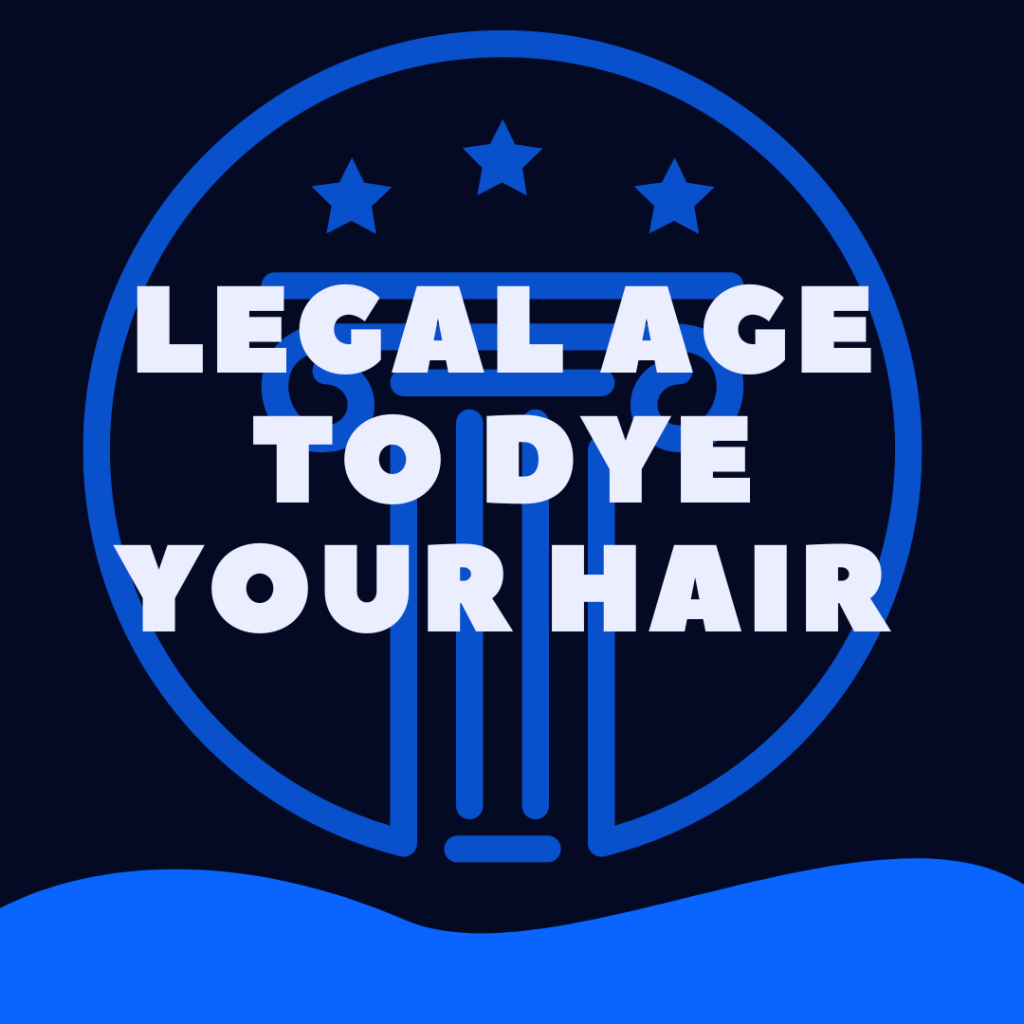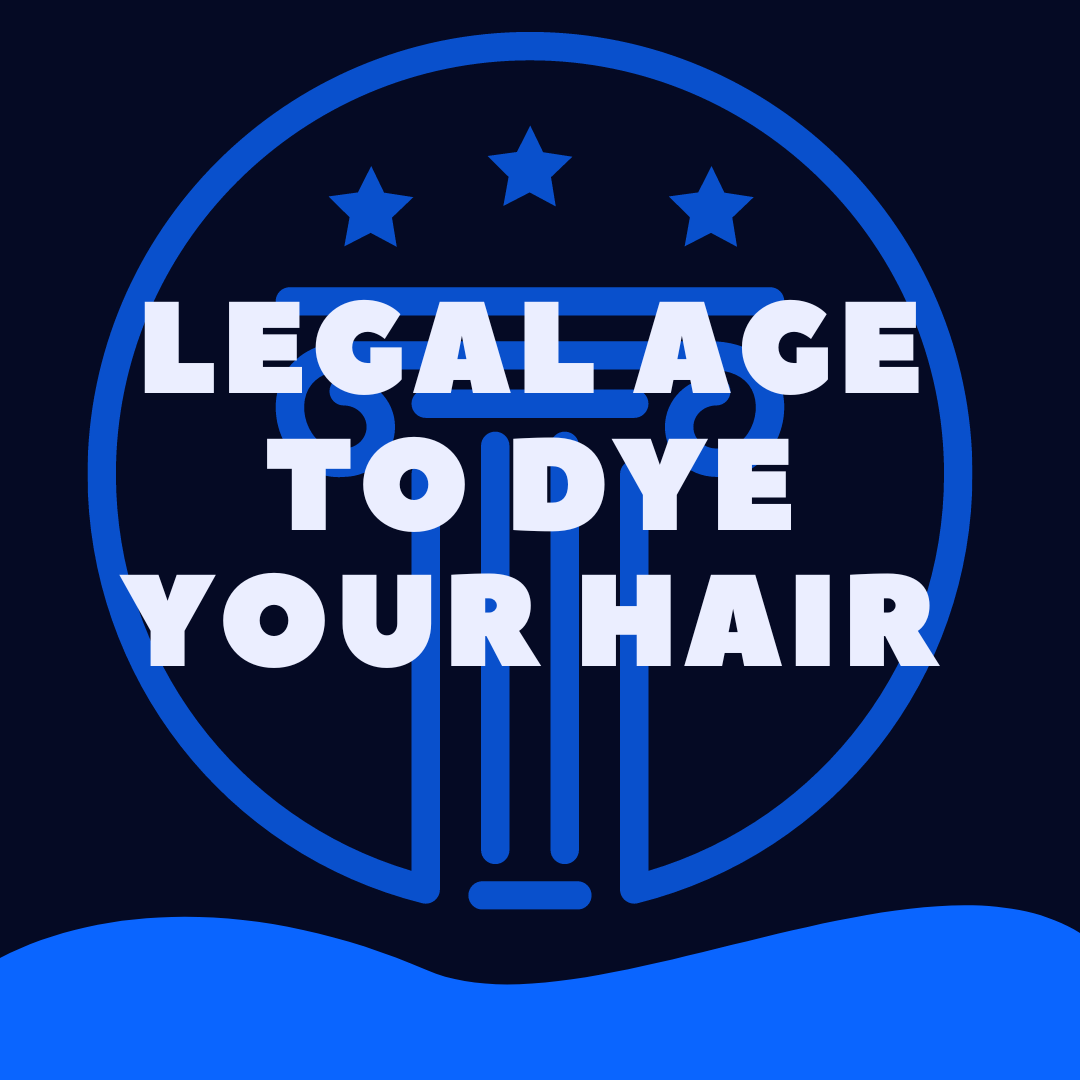While some manufacturers might impose age limits on their products based on the negative effects of certain ingredients on young scalps and hair, most states don’t have laws to dictate this aspect of haircare.
While dying your child’s hair might seem like a fun activity and bonding experience, it could be ill-advised in certain situations.
In this article, we’ll discuss when it’s appropriate and legal to dye children’s hair and answer other related questions.
What is the Legal Age To Dye Your Hair in the United States? (Discussion)
Disclaimer
The contents of this web page are for informational purposes only, and nothing you read is intended to be legal advice. Please review our disclaimer about law/legal-related information on this website before taking action based upon anything you read or see.
Although the United States doesn’t put any hard limits on when you can dye your hair, there are certain regulations and recommendations most qualified hairstylists would want to follow.
Hair dye manufacturers usually state that their products are meant for those aged 16 and older.
This is for a variety of reasons.
Firstly, many permanent hair dyes especially contain chemicals that could be harmful to developing bodies.
Secondly, younger people might experience more severe allergic reactions and adverse effects from hair dye.
To curb the potential for harm, many hair dye manufacturers essentially forbid hair stylists and cosmetologists from applying their products to clients who have not reached their 16th birthday yet.
This both protects the hair dye manufacturers from lawsuits from distraught parents and children who had bad reactions to the dye and the stylists who use them.
While hairstylists won’t go to prison or get fined for applying color to the hair of someone under the age of 18, most still won’t take the risk.
In fact, most professional salons in the United States have strict rules against booking clients under the age of 18 for hair dye or bleaching jobs.
Any salon that agrees to dye a teen’s hair under the age of 16 is putting themselves and the teen at risk.
After all, if the stylist isn’t following the manufacturer’s warning, any snags in the process or negative impacts will not be covered by the salon’s liability insurance.
Most hair professionals will agree that the risk of dying a teen’s hair outweighs the rewards.
Even in a scenario where the teen doesn’t have an allergic reaction or threaten to sue the salon for other reasons regarding the hair dye, it’s not worthwhile.
For young children, especially, even sitting still while waiting for their mom or dad to finish up a haircut is challenging.
Sitting still as the stylist applies the test swatch, waits for it to react, applies the dye, and finishes the treatment is a tall order for anyone. It’s a lot to ask a small child who wants to run around.
For the sake of the stylist doing the dye job and the child receiving it, it’s best to save getting hair dyed until the late teen years, when it will be safe and fun for all parties involved.
Is it a bad idea for teenagers and kids to dye their hair?
Since many teens want to go through an edgy phase of saturating their hair with edgy black dye or brightening it with bleach, it’s common to question whether it’s bad for teens to dye their hair.
While every parent and every teen is different, there are a few things that you should consider as a teen or parent of a teen who wants to dye their hair.
Since teenagers and children have finer hair than adults and more sensitive skin, they still may experience effects on the quality of their hair after treating it with dye and uncomfortable reactions to their skin.
As today.com explains, “…it’s important that parents remember that kids have very fine hair that can be easily damaged by ammonia, bleach, hydrogen peroxide, and other chemicals found in some hair colors.”
After all, the hair of teens and kids isn’t as mature as its adult counterparts. With a fine texture and fragile shaft, kids’ and teens’ hair is best suited to temporary dyes that simply coat the locks.
If you want to dye your child or teen’s hair, you can also use temporary alternatives like hair chalk or Kool-Aid dye for some colorful fun. If you use these during the school year, just check to make sure it’s allowed first.
Is it illegal for children to have dyed hair?
In most states and regions, it is not illegal for kids to have dyed hair. But that doesn’t mean that dyed hair is condoned in schools and other settings for children.
Many public and private schools in the United States have rules in their dress code that forbid unnaturally colored hair.
Some schools might allow for certain hair dyeing colors, like natural shades of brown, blonde, black, and red.
Some might also allow students to use temporary hair coloring products like hair chalk for special occasions such as homecoming or spirit week.
Still, most schools will forbid loud, wild colors like fire engine red or electric blue as hair colors.
Usually, schools don’t want to encourage bright hair colors because they could be seen as a distraction.
What’s more, schools intend to prepare students for professional settings. If a kid or a teen gets used to wearing his or her hair in a slime green shade, he or she might struggle to adapt to professional settings where this kind of hair coloring is not allowed.
Although children and parents won’t be fined for the child dying their hair, parents who allow their kids to dye their hair in unusual hues might face indirect legal consequences.
If unique hair colors become a regular problem, the child might end up being sent home regularly to correct the color to a natural shade. This could mean that excused absences will pile up, which might lead to disciplinary action by the school district.
The toll of dying and redying their hair will be costly financially, emotionally, and physically. Hair dye chemicals are harsh, so adult hair can only take so much before it becomes damaged and brittle.
Since kids and teens have finer hair than adults, their hair is even more vulnerable to breakage and even burning off with excessive bleaching.
In conclusion
Technically, the United States does not have any laws requiring people to reach a certain age before dying their hair.
However, most salons across the country will not dye the hair of someone under the age of 18 because of liability concerns.
If your child or teen wants to dye their hair, you should opt for dyes that don’t penetrate the hair shaft for the safety and condition of the hair.
Wrap Up
Want to learn more about your justice system?
Browse our free legal library guides for more information.
You might also like:
- Are Diving Boards Illegal in California?
- Is It Illegal To Name Your Child God?
- Is It Illegal To Flip off a Cop?
- It it Illegal To Be Friends With a Minor?
- Is It Illegal To Post Screenshots of Conversations?
- Is It Illegal To Use Diesel to Kill Weeds?
- Is It Illegal TO use Neighbor’s Wi-Fi?
- Is It Illegal To Use a Fire Hydrant?
- Is It Illegal To Name Your Child Adolf?
- Is It Illegal To Use Someone Else’s Address For School?


